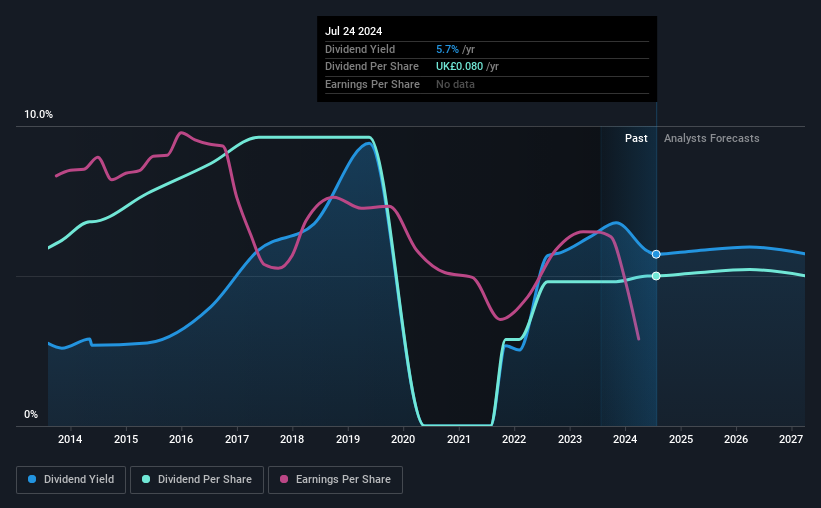BT Group (LON:BT.A) Is Increasing Its Dividend To £0.0569

BT Group plc (LON:BT.A) will increase its dividend on the 11th of September to £0.0569, which is 5.6% higher than last year's payment from the same period of £0.0539. This makes the dividend yield 5.7%, which is above the industry average.
While the dividend yield is important for income investors, it is also important to consider any large share price moves, as this will generally outweigh any gains from distributions. Investors will be pleased to see that BT Group's stock price has increased by 33% in the last 3 months, which is good for shareholders and can also explain a decrease in the dividend yield.
Check out our latest analysis for BT Group
BT Group's Dividend Is Well Covered By Earnings
Impressive dividend yields are good, but this doesn't matter much if the payments can't be sustained. Prior to this announcement, BT Group was paying out 92% of earnings and more than 75% of free cash flows. This indicates that the company is more focused on returning cash to shareholders than growing the business, but it is still in a reasonable range to continue with.
Over the next year, EPS is forecast to expand by 73.7%. Under the assumption that the dividend will continue along recent trends, we think the payout ratio could be 50% which would be quite comfortable going to take the dividend forward.

Dividend Volatility
The company has a long dividend track record, but it doesn't look great with cuts in the past. Since 2014, the annual payment back then was £0.095, compared to the most recent full-year payment of £0.08. Doing the maths, this is a decline of about 1.7% per year. Generally, we don't like to see a dividend that has been declining over time as this can degrade shareholders' returns and indicate that the company may be running into problems.
The Dividend Has Limited Growth Potential
Growing earnings per share could be a mitigating factor when considering the past fluctuations in the dividend. Earnings per share has been sinking by 17% over the last five years. A sharp decline in earnings per share is not great from from a dividend perspective. Even conservative payout ratios can come under pressure if earnings fall far enough. On the bright side, earnings are predicted to gain some ground over the next year, but until this turns into a pattern we wouldn't be feeling too comfortable.
The Dividend Could Prove To Be Unreliable
In summary, while it's always good to see the dividend being raised, we don't think BT Group's payments are rock solid. The payments are bit high to be considered sustainable, and the track record isn't the best. We would be a touch cautious of relying on this stock primarily for the dividend income.
Market movements attest to how highly valued a consistent dividend policy is compared to one which is more unpredictable. Still, investors need to consider a host of other factors, apart from dividend payments, when analysing a company. For example, we've picked out 4 warning signs for BT Group that investors should know about before committing capital to this stock. Looking for more high-yielding dividend ideas? Try our collection of strong dividend payers.
Valuation is complex, but we're here to simplify it.
Discover if BT Group might be undervalued or overvalued with our detailed analysis, featuring fair value estimates, potential risks, dividends, insider trades, and its financial condition.
Access Free AnalysisHave feedback on this article? Concerned about the content? Get in touch with us directly. Alternatively, email editorial-team (at) simplywallst.com.
This article by Simply Wall St is general in nature. We provide commentary based on historical data and analyst forecasts only using an unbiased methodology and our articles are not intended to be financial advice. It does not constitute a recommendation to buy or sell any stock, and does not take account of your objectives, or your financial situation. We aim to bring you long-term focused analysis driven by fundamental data. Note that our analysis may not factor in the latest price-sensitive company announcements or qualitative material. Simply Wall St has no position in any stocks mentioned.
Have feedback on this article? Concerned about the content? Get in touch with us directly. Alternatively, email editorial-team@simplywallst.com
About LSE:BT.A
BT Group
Provides communications products and services in the United Kingdom, Europe, the Middle East, Africa, the Americas, and the Asia Pacific.
Undervalued with acceptable track record.
Similar Companies
Market Insights
Community Narratives




